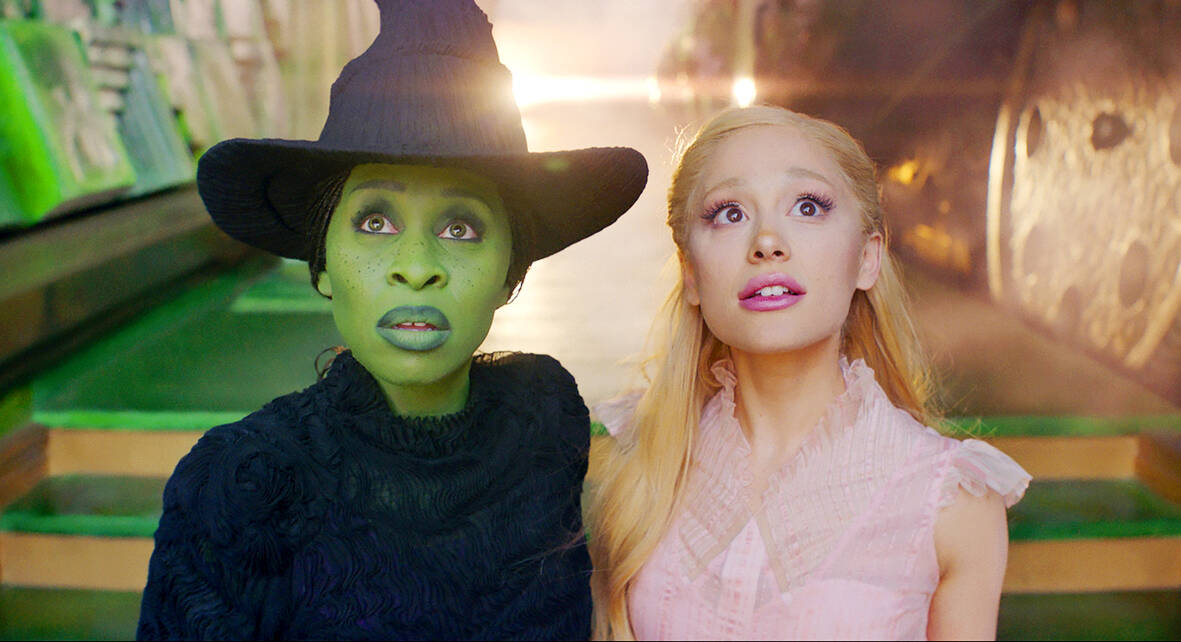When reacting to Oscar nominations, actors traditionally err on the side of hyperbole. This year was no exception.
“I don’t know if I’m quite in my body,” said Demi Moore, on learning she was shortlisted for The Substance.
“I looked at my phone and fell on the floor,” said Monica Barbaro, who plays Joan Baez in A Complete Unknown.

Photo: AP
“I actually haven’t stopped sobbing,” offered Ariana (Wicked) Grande.
Karla Sofia Gascon, however, bucked the trend. The first out trans actor ever nominated for an Oscar took the opportunity to address the executive order signed by Donald Trump earlier this week, restricting US government recognition to only biological sex.
“He is shameless,” she said. “I hope that whatever needs to happen happens to shut everyone up, on both sides.”

Photo: AP
Such focus in the debate until the ceremony on March 2 seems unlikely. This year’s Oscar contenders amount to a collective broadside against a president campaigned against by almost everyone in the industry. His re-election — and the collapse in celebrity leverage that it revealed — remains a sore point. As the Golden Globes host Nikki Glaser reminded her A-list audience earlier this month: “You’re all so famous, so talented, so powerful, you could really do anything. Well, except tell the country who to vote for.”
Hollywood has therefore opted to vote with its Academy ballots, giving a leg-up to films that conspicuously critique the Maga worldview. Hence, perhaps, such an extravagant embrace for Emilia Perez, a French musical about a trans Mexican gangster that has been criticized as “offensive” by both Mexican and trans communities, and met with a mixed reception from critics and audiences (with Rotten Tomatoes scores of 76 percent and 30 percent respectively).
Nonetheless, the film has smashed the record set by Crouching Tiger, Hidden Dragon and Roma for the most nominations for a film not in the English language, scoring 13 to their 10, putting it just one behind the all-time record earned by All About Eve, Titanic and La La Land.
The only film on this year’s lists that is more of an explicit attack on the new president is The Apprentice, Ali Abbasi’s unflattering biopic of the young Trump, focusing on his rise to power and ill-treatment of his then wife, Ivana, and one-time mentor, the lawyer Roy Cohn.
A “disgusting hatchet job,” was the verdict of its subject, who called its makers “HUMAN SCUM” and urged audiences to avoid it. US distributors ran correspondingly scared, despite strong reviews and an eight-minute standing ovation at Cannes, until the small outfit Briarcliff eventually risked releasing it in October.
The film’s leading actor, Sebastian Stan, reported that Hollywood was so intimidated by Trump that none of his peers would appear opposite him in Variety’s annual Actors on Actors series, in which awards contenders quiz one another on video.
“We couldn’t get past the publicists or the people representing them because they were too afraid to talk about this movie,” he said. Variety verified his claims.
Nonetheless, three days after Trump’s inauguration, Stan landed an Oscar nomination — as did the supporting actor Jeremy Strong (who plays Cohn). Both men expressed their shock, with the former calling the Academy “brave” and the later saying the nods felt “absolutely miraculous.”
Such a miracle, says Variety’s executive editor, Steven Gaydos, is thanks to a “stick it to the man” passion that has been brewing in Hollywood since 2016 and is now turbocharged by Trump’s re-election. (The fires that have destroyed many voters’ homes over the past fortnight, he suggests, may have fuelled a devil-may-care recklessness.)
Not only has this feeling propelled such films into pole position, says Gaydos, it may push some over the finish line: “This sentiment could benefit them all come Oscar night.” The competition may therefore be decided as much on how much the movie baits the president as its artistic merit.
Campaigns are likely to start to amplify such credentials. The smash-hit fantasy Wicked could be seen as an incisive critique of racism and fascism via a green-skinned witch and talking animals.
Indeed it’s hard to identify a film on the shortlist that can’t be interpreted as a salvo against the 47th president. The space opera Dune: Part Two cautions against colonization; The Brutalist is scathing in its portrayal of the way the US treats immigrants. Nickel Boys addresses head-on the institutionalized murder of young Black men in the Jim Crow south. Anora examines sexual exploitation and the wealth divide; The Substance satirizes reality TV’s obsession with eternal youth and Brazil’s I’m Still Here shows what life looks like under military dictatorship.
Writing in the New Yorker after this year’s nominations, the critic Richard Brody said the “members of the Academy have, in effect, responded to the natural and political disasters of the moment in the name of solidarity.”
“A remarkable consensus has crystallized among a small number of movies that, in one way or another ... embody, display, or at least appear to celebrate the liberal values of pluralism, equality, and resistance to the arrogance of power, be it political or economic. This time around, the Oscars are circling the wagons.”

Taiwanese chip-making giant Taiwan Semiconductor Manufacturing Co (TSMC) plans to invest a whopping US$100 billion in the US, after US President Donald Trump threatened to slap tariffs on overseas-made chips. TSMC is the world’s biggest maker of the critical technology that has become the lifeblood of the global economy. This week’s announcement takes the total amount TSMC has pledged to invest in the US to US$165 billion, which the company says is the “largest single foreign direct investment in US history.” It follows Trump’s accusations that Taiwan stole the US chip industry and his threats to impose tariffs of up to 100 percent

On a hillside overlooking Taichung are the remains of a village that never was. Half-formed houses abandoned by investors are slowly succumbing to the elements. Empty, save for the occasional explorer. Taiwan is full of these places. Factories, malls, hospitals, amusement parks, breweries, housing — all facing an unplanned but inevitable obsolescence. Urbex, short for urban exploration, is the practice of exploring and often photographing abandoned and derelict buildings. Many urban explorers choose not to disclose the locations of the sites, as a way of preserving the structures and preventing vandalism or looting. For artist and professor at NTNU and Taipei

March 10 to March 16 Although it failed to become popular, March of the Black Cats (烏貓進行曲) was the first Taiwanese record to have “pop song” printed on the label. Released in March 1929 under Eagle Records, a subsidiary of the Japanese-owned Columbia Records, the Hoklo (commonly known as Taiwanese) lyrics followed the traditional seven characters per verse of Taiwanese opera, but the instrumentation was Western, performed by Eagle’s in-house orchestra. The singer was entertainer Chiu-chan (秋蟾). In fact, a cover of a Xiamen folk song by Chiu-chan released around the same time, Plum Widow Missing Her Husband (雪梅思君), enjoyed more

From insomniacs to party-goers, doting couples, tired paramedics and Johannesburg’s golden youth, The Pantry, a petrol station doubling as a gourmet deli, has become unmissable on the nightlife scene of South Africa’s biggest city. Open 24 hours a day, the establishment which opened three years ago is a haven for revelers looking for a midnight snack to sober up after the bars and nightclubs close at 2am or 5am. “Believe me, we see it all here,” sighs a cashier. Before the curtains open on Johannesburg’s infamous party scene, the evening gets off to a gentle start. On a Friday at around 6pm,